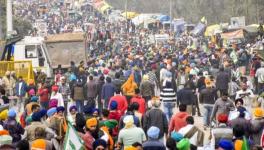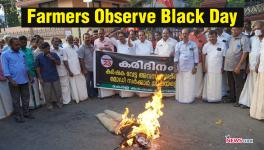Lack of Waste Disposal, Clean Toilets Affects Farmers’ Protests, Govt Apathetic: Report
File Photo.
The Delhi and Haryana chapters of Jan Swasthya Abhiyan and Nation for Farmers have urged the central and state governments to take urgent steps to ensure proper health and living conditions for the farmers, including women, camping at the protest sites at five border points of Delhi for nearly a month and a half.
A rapid assessment survey of basic amenities available at the protest sites in Singhu, Tikri, Shahjahanpur, Gazipur and Palwal, conducted by the Jan Swasthya Abhiyan (JSA) in December 2020, found that lack of proper sanitation, insufficient lighting, mismanagement of solid waste disposal, water stagnation, and shortage of warm clothes are affecting the protesters.
“In the absence of any resolution in sight, it seems that they (farmers) will continue to camp at their present locations for quite some time. Under these circumstances, it is important that they have access to basic facilities crucial for daily living such as food, toilets and clean drinking water,” JSA and Nation for Farmers said in a press statement on Monday.
Currently, most of the services (such as cleaning) and provisions (such as food and drinking water) are being provided by volunteers, gurdwaras and civil society groups.
The survey has revealed that the number of mobile toilets at the protest sites are inadequate and their maintenance is not properly carried out by civic authorities of the respective areas. As a result, the toilets have become dirty and unusable, leading to “a considerable number of protesters to resort to open defecation”. Almost three in every five respondents – 57.5% – have to rely on open sites for defecation.
Additionally, the toilets have no provision of lighting, which makes it difficult to use them after dark. Women are facing additional problems as they do not want to resort to open defecation. “Many women protesters reported that they are eating less and consuming less water to avoid using toilets,” the JSA said.
The survey shows there is a lack of effort on the part of authorities in disposing of solid waste. Overall, only 23.6% of respondents said solid waste was getting disposed of regularly. The situation appeared to be a bit better in Shahjahanpur where 56.5% respondents said they waste disposal was taking place regularly. In Singhu and Tikri, the two biggest protest sites, day by day more waste is getting accumulated and civic bodies are missing in action.
Among women protesters, there are also issues regarding sanitary pads. While sanitary pads were largely not available at the protest sites, disposal of the pads emerged as another major challenge; around 31% of the women had to dispose of the used pads on roadsides in absence of a waste disposal system provided by local authorities.
Water stagnation is yet another problem. Around 40% of respondents said there was water stagnation around the protest sites. The situation was most severe at Gazipur where more than nine out of every ten people found water stagnation. However, they said it was the volunteers who were stopping the situation from becoming worse.
There is also lack of mental health support from the protesters with many showing depressive and suicidal tendencies, the survey showed. Around three suicides have been reported this month alone whereas dozens offarmers have diedduring the protest amid extreme weather conditions.
“The support from volunteers, individual citizens and organisations such as Jan Swasthya Abhiyan has been overwhelming and sustaining the struggle so far. However, the State cannot abdicate its responsibility towards its citizens. Protestors and their supporters have been left on their own during the severe cold wave conditions in North India. It shows nothing less than a total apathy by various governments,” said Satnam Singh, State Coordinator of Jan Swasthya Abhiyan-Haryana and a core member of the survey team.
Condemning the government for not providing basic facilities to the protesters, he said, “Already more than 50 people have lost their lives under the adverse weather conditions. Even the medical facilities are being arranged by the volunteers and civil society and other philanthropic organisations.”
Following the survey, JSA and Nation for Farmers have put for an eight-point demand to the governments concerned. Following are their demands:
1.Provide proper sanitation facilities in the form of adequate number of mobile toilets and arrange for regular cleaning of these toilets
2.Make arrangements for clean drinking water
3.Arrange for regular solid waste collection and disposal from all the protest sites
4.Ensure that nearby public medical facilities (PHCs, CHCs, DH) are geared to provide medical facilities and medicines to the people in need at these sites, which are linked with outreach activities at all protest sites, with sufficient number of doctors and health professionals, added with referral arrangements and adequate ambulance services. Special focus on NCDs and geriatric care will be required here too.
5.Deploy active mental health care and counselling teams in all protest sites and actively motivate people to seek support from these facilities whenever needed.
6.Set up tents at various sites to improve protection from climate related health issues.
7.Regular efforts to contain mosquitoes and flies.
8.Shahjahanpur specific demand: Since the protest is on a national highway with heavy traffic which is causing threats to the health of protesters, not only in the form of dust and allergy, but as threats to the temporary tents and the fear of accidents. There should be proper control measures to address all these.
Get the latest reports & analysis with people's perspective on Protests, movements & deep analytical videos, discussions of the current affairs in your Telegram app. Subscribe to NewsClick's Telegram channel & get Real-Time updates on stories, as they get published on our website.
























